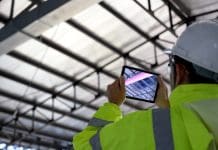Using virtual reality, Graham presented the design team’s 3D models to client representatives and subcontractors, allowing them to virtually navigate through the building and explore the finished project
The virtual reality software enabled users to suggest changes to every aspect of the showroom’s finish, and to consider how light and alternative materials could impact the look and feel of the room.
Situated in Manchester, Trentham Street, the project on behalf of Glenbrook Developments, consists of two residential blocks (15 and 14 storeys) incorporating 280 apartments for private rent.
Upon completion in summer 2020, residents will enjoy access to lounges, gardens, a gym and yoga studio, while there will also be commercial space on the ground floor of one of the blocks.
Victoria Allen, Graham Digital Construction Coordinator, said: “VR not only provides greater transparency of the build, but, importantly, it allows for beneficial feedback, which can then save vital time and resources, and potentially avoid costly extras for things that, without VR, may be changed at a later stage in the project.
“Collaboration is a key benefit of VR as stakeholders are empowered to make smarter decisions through increased visualisation, and the opportunity to consult and engage with key project decision-makers.
“It also promotes spatial awareness. This means potential risks can also be realised simultaneously, and, subsequently, mitigation measures can then be agreed.”
In addition to VR, the attendees also tested our Augmented Reality (AR) application which has been developed in-house. This supported the interrogation and coordination of mechanical and electrical elements before installation on site.









![[VIDEO] Enscape launches new real-time rendering software Enscape rendering image of architecture](https://www.pbctoday.co.uk/news/wp-content/uploads/2022/07/SunlightPosition_01-218x150.jpg)







